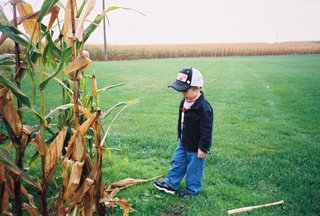Three Year Old Eschatology

I have learned a lesson in persistence in prayer from my three and a half year old. Nearly every night at bedtime for the past 10+ months since the tsunami, my son Will has either prayed or asked me to pray for “the people affected by the tsunami” (a phrase he got from me, but it has become his own). Since the time of Hurricane Katrina he’s expanded his prayer to include “the people affected by the tsunami and the hurricane.” If I’m winding down my part of the prayer and haven’t said it yet, he interrupts me to insist that I pray for them. I have to confess that I probably wouldn’t have thought much at all about the people affected by the tsunami in several months had it not been for Will’s insistence that we not neglect to lift them before the Lord.
As we were praying the other night he was feeling a little extra verbose, so he added to his normal prayer saying “And God, we pray that one day you will stop all these tsunamis and hurricanes.” Wow. It was a simple prayer from a child who really didn’t know what he was asking, but it struck me deeply, reminding me that the world we live in, the world in which I’m trying to raise my kids is “not the way its supposed to be” but that one day it will be. It reminded me that I have a certain obligation to teach my children both about our hope that things will one day be made right, and also to teach them to recognize that that day has not yet come. Things aren’t the way they’re supposed to be, and that obliges us to pray, and hope, and work.
In his book Educating for Life, Yale philosopher Nicholas Wolterstorff writes about Christian education, suggesting that part of teaching children to think and live Christianly in this world is to teach them to “lament the absence of shalom wherever we find it absent.” He writes: “Christian education must exhibit and teach for lament. The cry “This should not be,” so far from being smothered, as all too often it is, must be allowed, even encouraged. Why is that? For one thing, the struggle for the healing of broken and distorted relationships can be genuine only if it emerges from a heartfelt lament. But second, to teach our [children] to love the earth, to love God, to love culture, to love each other, to love oneself, is, as all of us know who have loved, to court the possibility, indeed, the certainty, of grief and sorrow” (Educating for Life: Reflections on Christian Teaching and Learning, 263).
As a father, it is a challenge to know how to appropriately teach a three and a half year old child how to lament, but in forcing me everyday to remember the thousands of people on the other side of the world whose lives are still in shambles, my three an a half year old has taught me how.
Yes, Lord. Will you one day stop all these tsunamis and hurricanes? Will you make all that is wrong with our world and all that is wrong with me right?
Barry... what a great story! Thanks for sharing it.
Nice picture too...
You know, if you build it, he will come... ;-)
Posted by russ |
10:49 PM
russ |
10:49 PM
Thanks, Russ.
That picture was actually taken at the real "Field of Dreams" baseball field in the middle of a corn field in Iowa. After they made the movie they kept the field and we visited there a couple of months ago.
Posted by Kim |
11:13 PM
Kim |
11:13 PM
That is a very nice reminder. I have read portions of Wolterstoff's book, and your quote reminds me to fetch it back off my shelf!!
As a father of three children (ages 7, 5 and 5), I affirm your passion to teach in this manner of "This should not be."
How often do we rather hear, "Oh, God is in control; he must have had a plan..." or some such thing to explain tragedies. That is a truncated theology that does not take seriously the absence of Shalom in our current fallen situation.
Thanks!
Posted by Bob Robinson |
10:42 AM
Bob Robinson |
10:42 AM
you can add my voice and "amen" to Will's...
Posted by Sam |
4:56 PM
Sam |
4:56 PM